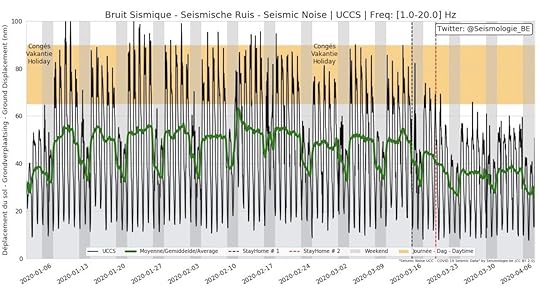Seismic noise declines

Just as traffic levels are dropping during the coronavirus lockdowns, so are the noise levels in cities around the world and seismometers are noticing.
Although seismometers are used to detect ground motions like earthquakes, volcanic eruptions, and explosions, they are so sensitive that they can also pick up noise patterns caused by daily hustle and bustle. This background noise makes it harder for seismologists to detect smaller seismic or volcanic events.
But with over one-third of the world’s population currently staying at home, the planet is getting quiet and man-made seismic noise is decreasing.
The seismometer at the Royal Observatory of Belgium showed that vibrations caused by human activity in Brussels have fallen by about one-third since March 18.
Update this morning: anthropogenic noise is still low. We also compare the median noise per weekday/hour before/after lockdown! #staysafe #stayhomebelgium pic.twitter.com/iAE1imBuEj
— Seismologie.be (@Seismologie_be) April 6, 2020
In Milan, a seismograph station also recorded the sharp decline in traffic in the Po Plain after lockdown measures took effect on March 8. Comparing recordings from February 24 and March 30, it showed a significant decrease in noise, as almost no cars were moving in or out of the city by the end of March.
Variazione del livello di rumore ambientale in seguito ai decreti per l’emergenza COVID-19 https://t.co/XQXXl7fmqJ
— INGVterremoti (@INGVterremoti) April 1, 2020
The pattern remained consistent in other countries around the world, like the UK, New Zealand, and France, where seismometers all recorded a significant drop in noise caused by human activity. 

More like this: Pro tips for working from home, from the Matador staff who do it year-round
The post Amid worldwide lockdowns, seismic noise has gone way down appeared first on Matador Network.

Matador Network's Blog
- Matador Network's profile
- 6 followers



